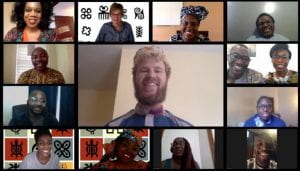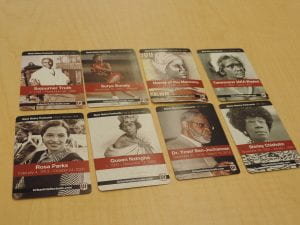On this Juneteenth, we celebrate the end of slavery. But the horrific and painful lynching of George Floyd proves that Black people are not afforded the same inalienable rights as white people. I have taken the time to learn about the murders of Breonna Taylor, Tony McDade, Rayshard Brooks, and many others who were senselessly killed by those we entrust to enforce the law. I send my condolences to their families and communities for the senseless and tragic loss of their lives.
While the Center for Social Policy has always focused on uncovering the root causes of inequities – racial, gender, and class – recent events prompted me to deepen my understanding of systemic racism. After losing myself in many book lists focused on racial injustice, I realized I could start with books already on my shelf, waiting to be read. I began with Stacey Abrams Lead from the Outside, which is both a memoir and a how-to on how Abrams created and achieved her many successes in law, politics, publishing, and non-profits. I recommend Lead from the Outside for anyone seeking to understand the barriers Black women face, the extraordinary hurdles they are forced to overcome, and strategies they can apply to create pathways to leadership.
To learn more about racial injustices and law enforcement, I watched 13th, a documentary which centers around the 13th Amendment to the Constitution, which outlaws slavery except as a punishment for a crime. It graphically depicts, from the Civil War to the present day, how the law has been grossly and unfairly applied to Black Americans. It reveals how the law has been used to justify ongoing murder, mass criminalization, prison labor, and the growing prison industry. Next up, also already on my bookshelf, I plan to finish The New Jim Crow, which focuses on how the criminal justice system operates as a means of racial control, stripping prisoners and returning citizens not only of their basic right to vote, but also of their access to housing, employment, and public benefits.
Of course, it is understanding this intersection – the need for public benefits due especially to high housing costs combined with low paying jobs – that is the focal point of the Center for Social Policy. Workers in these low-pay jobs such as frontline healthcare employees or grocery cashiers have been rebranded as “essential workers” or “heroes.” No matter how essential their labor is to our basic needs of health and food, these jobs rarely pay a living wage, offer health benefits, paid leave, flexible schedules, or other benefits that those of us non-essential workers who are privileged to work from home take for granted. It is important to remember that these essential workers are disproportionately people of color.
As a result of these low quality jobs, many essential workers are at greater risk for food insecurity and homelessness. Consequently, they need to rely on public benefits to meet basic financial needs. The challenge of balancing public benefits with income is nearly impossible, due to the benefits cliff, where a small increase in income leads to a loss of critical supports, such as housing assistance.
Our research at CSP intends to end this “incarceration by social policy” that disproportionately traps Black Americans, especially Black mothers. Transformational change is needed, starting at the federal level, and it must go hand-in-hand with reforms in criminal justice. Without it, the freedom of Blacks from slavery and death will not go far enough, as families of color will still be unable to climb the economic ladder as they watch their white peers gain a hand up each step of the way.
What does Black Lives Matter mean for the Center for Social Policy, an applied research center? Our work includes research, evaluation, technical assistance, tools, and guides. Many of our projects already focus on racial equity, but now we commit to going deeper and being more intentional with each and every project. Specifically, every project CSP undertakes will follow these guidelines:
- Continue to center the voices of Black people and other people of color, who are impacted by economic hardship, so that our work is grounded in their lived experience. In this way, our analysis will ensure that policies and practices will not create unintended consequences for Black people.
- Increase the use of racial equity frameworks, employing tools and assessments such as those created by Race Forward. In that way, we will be better equipped to identify and develop solutions to better address systemic racism.
- Specifically request that partners and key stakeholders include persons of color during the research process. Our work frequently involves interviewing community and business leaders. For these projects, we will request our interview targets include at least one interviewee of color as part of the process.
- Continue attempts to disaggregate data by race, but now share more technical details when race data are not available. Sometimes race and ethnic data are not available because it is not provided by respondents or because doing so could cause concerns about identifying specific individuals, thereby destroying anonymity. But often it is not provided by public government agencies who are either not tracking it, or may have the data but refuse to share it. In those cases, we will provide more information about the ways the data were requested and why it was not provided.
The work is not easy. As an example, since we know that people of color are disproportionately poor, and that systemic racism is deeply embedded in our institutions and systems, we have designed a research study that explores the relationship between employment and public benefits from a racial lens. The planned study is both quantitative and qualitative, centering the voice of impacted Black families. The goal is to develop policy changes that will alleviate identified cliff effects to encourage family stability and economic mobility.
But over the past few years, the study was rejected by three funders, and it did not fit the criteria for two other funders we were targeting.
We will keep trying. Black families deserve more than merely a right to live and freedom from slavery. Black families deserve the right to live without violence, without health disparities, without economic hardship, and so much more.
In Justice,
Director, Center for Social Policy





